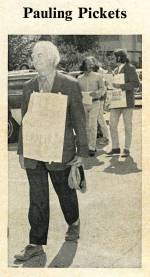| A Slowing Pace: Peacework in the 1970s |
|
Though the 1970s began robustly with Linus' receipt of the Lenin Peace Prize from
the Soviet government, the decade was more generally defined by a slowing in the pace
of the Paulings peace work. At last, they were finally learning how to do less. They
retired to their lovely house overlooking the Pacific at Big Sur, brought in electricity
and phone service, expanded and modernized it, and installed a swimming pool. Pauling
started his own research institute devoted primarily to investigating the properties
of Vitamin C and other nutrients, and began devoting more of his energy once again
to science.
Nonetheless, the Paulings did continue to speak out forcefully on a number of issues.
In the early part of the decade, Linus and Ava Helen remained staunch and highly public
critics of U.S. military incursions in Vietnam and Cambodia. Later, as the hot war
in Southeast Asia began to cool, the Paulings increasingly turned their attention
to the brewing Cold War between the United States and the Soviet Union, with specific
focus upon the stockpiling of nuclear weapons by both countries. And throughout the
1970s, both Linus and Ava Helen cautioned their audiences against the potential health
hazards of nuclear energy and its resultant wastes, advocating instead for increased
reliance upon clean and renewable sources of energy.
|
|
Click images to enlarge

"Pauling Pickets." October 1971.

"Lenin Prize to Pauling." April 17, 1970.
"Future generations should...not be deprived of their share of the world's natural
resources. Some of these resources are inexhaustible. An example is sunlight. We
may convert some of the energy of sunlight into electric power, which, after doing
useful work, is finally converted to heat and warms the Earth, as it would have done
if it had not been converted to electric power. The sun will continue to shine for
future generations, whether we use it for electric power or not. Solar energy, like
energy obtained from the wind or tides, does not rob future generations."
|

